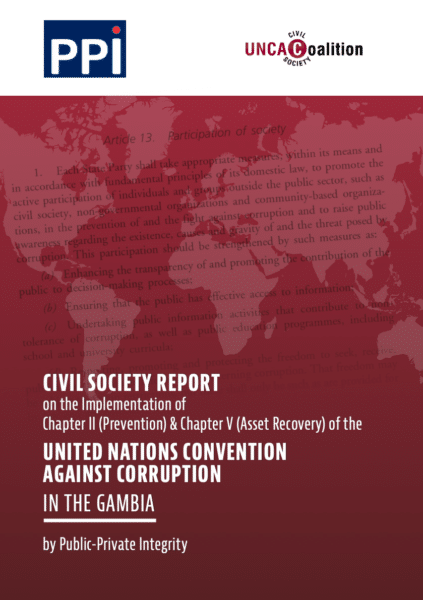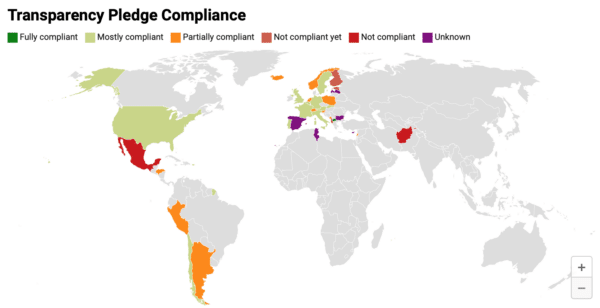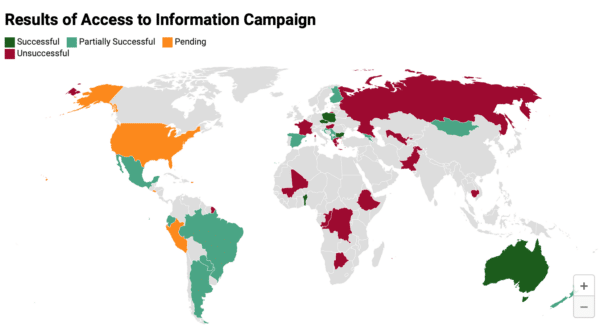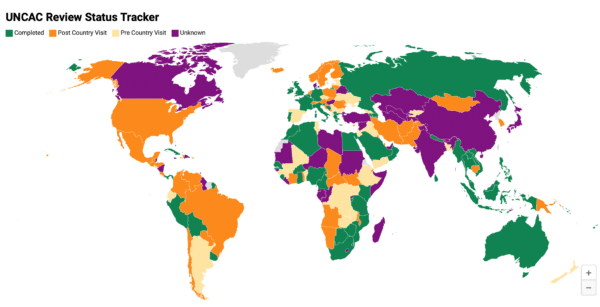12 May 2023 –
Starting with a warm welcome to our new Regional Coordinator for Sub-Saharan Africa, Mr. Bright Sowu, the 10th Regional Meeting for members and affiliates from Sub-Saharan Africa was dedicated to a discussion on the UNCAC Coalition tools. The aim was to equip members with ways to actively advance transparency and civil society participation in the UNCAC review mechanism, and pursue the collective objective of the UNCAC Coalition and its network globally. The discussion of the tools was led by the Project Manager of the Coalition, Ms. Danella Newman.
The 5 UNCAC Coalition tools presented are:
- The Transparency Pledge
- Guide to Transparency and Participation in the UNCAC Implementation Review Mechanism,
- Civil Society Parallel Reports,
- Access to Information Campaign and
- UNCAC Review Status Tracker.
1) The Transparency Pledge
The Transparency Pledge is a voluntary commitment by States Parties to meet minimum standards of transparency and civil society participation in the UNCAC review mechanism. The Pledge promotes six principles of transparency and inclusion.
The six principles of the pledge are:
- We will publish updated review schedules for our country review
- We will share information about the review institution or the coordinator (focal point)
- We will announce the completion of the country review indicating where the report can be found
- We will promptly post online the self-assessment and the full country report in a UN language, together with the executive summary in local languages
- We will organize civil society briefings and public debates about the findings of the report
- We will publicly support participation of civil society observers in UNCAC subsidiary bodies
The UNCAC Coalition Hub in Vienna conducts outreach to UNCAC focal points at the international level. Our members in Sub-Saharan Africa, and globally, are complementing this with advocacy efforts at the national level. One of the most fruitful strategies for getting national governments to sign the pledge has been the formation of coalitions of civil society organizations (CSOs) at the national level, to jointly push for their governments to sign the pledge.
The signing of the Pledge is not an end in itself. Governments have to demonstrate their compliance with the principles of the pledge in practice. Civil society has an important role to play in monitoring the implementation of the Pledge principles. The Transparency Pledge compliance tracker is a useful accompanying tool for this monitoring exercise.
In Sub-Saharan Africa, there has been only one signatory to the Pledge, Mauritius, which is mostly compliant with its principles, but the Coalition has received good signs from more governments willing to look into signing the pledge. CSOs at the Regional Meeting were encouraged to intensify advocacy efforts to get their governments to sign the Pledge and discussed ways to do so effectively.
2) Guide to Transparency and Participation in the UNCAC Implementation Review Mechanism
The Guide to Transparency and Participation in the UNCAC Implementation Review Mechanism (French Guide available) shows the many ways CSOs could get involved in the preparation stage, the self-assessment checklist stage (by commenting on a draft the government shares with civil society and participating in roundtable discussions), and the country visit stage of the UNCAC country reviews. This Guide provides both civil society and States Parties, the ones that have signed the Pledge and others too, with best practice examples of ways to be transparent and participatory in their UNCAC reviews. The ultimate goal is to improve implementation of the UNCAC provisions at the national and global level.
3) Civil Society Parallel Reports

The UNCAC Coalition encourages civil society organizations to write country Civil Society Parallel Reports on the implementation of Chapters II (Preventive Measures) and V (Asset Recovery) of the UNCAC in their country and offers technical and some financial support to organizations from Official Development Assistance (ODA) recipient countries . Civil society parallel reports provide an independent perspective on national UNCAC implementation. They aim to go beyond analyzing if UNCAC provisions have been integrated into the national legal framework and shine a light onto their implementation in practice (or lack thereof).
The Coalition plans to re-open the call for applications for support in June or July 2023. All information on the requirements to receive support and further information on what a parallel report entails can be found on this website. Only one parallel report per country can be supported. Countries from Sub-Saharan Africa where parallel reports have been produced or are currently in progress are: Zimbabwe, Benin, Ghana, Madagascar, Uganda, Togo, Liberia, Democratic Republic of the Congo, Gambia, Ethiopia (soon to be published), Guinea, and Zambia (ongoing).
In addition to the parallel reports, there is some financial support for groups who have done parallel reports to conduct targeted follow-up activities, though the maximum number of groups we are supporting for 2023 has already been reached. There are interesting and innovative ways of doing this, as you can see from last year’s examples of follow-up activities conducted by civil society organizations in Madagascar, Liberia and Togo.
4) Access to Information Campaign
The Access to information campaign is another useful Coalition tool. The UNCAC Coalition invites CSOs from around the world to join a campaign that uses access to information requests to ask national governments to release key documents and information about what they have done to implement the provisions of the UNCAC. The Coalition provides civil society organizations with a template and guidance on how to use it.
In Sub-Saharan Africa, there has been only one fully successful case in Benin and there have been five cases of unsuccessful requests of information in Botswana, Congo, Democratic Republic of the Congo, Ethiopia and Mali, where the government refused to release information, stating different reasons (if at all). See more campaign findings here. The journey is one that requires perseverance. The Coalition also supports CSOs in requests for information appeals.
5) UNCAC Review Status Tracker
The UNCAC Review Status Tracker comprises both an interactive map and a spreadsheet which allows you to see all information available on where countries stand within their second UNCAC review cycle. This information includes national UNCAC focal points, available documents, the availability of a civil society parallel reports, Transparency Pledge compliance status, etc. There are ways for civil society to get involved at all stages of the review (see our Guide mentioned above).
Discussion and way forward
The discussion on the tools that followed showed participants’ initial attempts of using the tools and ways of doing so individually, or collectively to increase the likelihood of their effectiveness. Several CSOs said they would look into ways of advancing transparency and civil society participation in their national UNCAC review. A conclusion was that it might be useful to engage the Regional Meeting on the tools annually.






